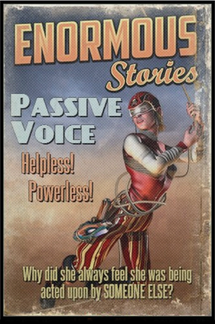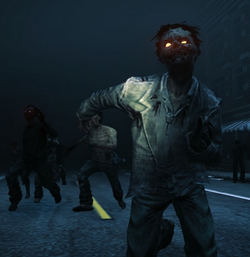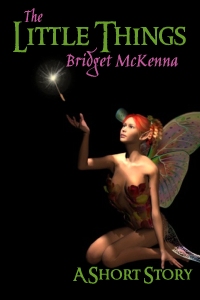
Passive Voice
If you’ve been at this writing lark any time at all, you’ve probably heard that something called “passive voice” is a no-no. That’s almost entirely true. Passive voice should be eliminated wherever possible. (No! The passive—it burns!) Or I should say: strive to keep your sentences active.
The first step for a writer hoping to understand and thereby eliminate the problem of passive voice from her writing is to understand the difference between active and passive sentences.
In an active sentence, the subject is the person (or place or thing) who performs the action of the sentence. If the subject performs the action on someone (or someplace or something), that becomes the object.
The manager handed Maury his ass.
Manager is the subject, Maury (and his ass) are objects.
Paris displayed all her autumn colors along the banks of the Seine.
Paris is the subject. Paris acts on colors, which are the object.
The stone struck Alvin between the eyes.
The stone is the subject. It acts on Alvin, who is the object.
In a sentence in the passive voice, the subject and object may trade places.
Maury got his ass handed to him by the manager.
Maury has become the subject, but he’s not acting; he’s being acted upon by the manager.
All of Paris’s autumn colors were displayed along the banks of the Seine.
The colors have become the subject, but they aren’t doing anything but being displayed. They’ve become passive.
Alvin was struck between the eyes by a stone.
 Um...Alvin? DUCK!
Um...Alvin? DUCK! First rule of active sentences: subjects act.
Sometime a passive voice construction has no actor—the object of the sentence is mysteriously acted upon by no-one at all.
Mistakes were made.
Explanations were called for.
The body was moved.
The result, as in the previous examples, is a weak, flabby sentence.
Remember this: someone always has to move the body, and passive voice leeches life from your writing.
It's totally zombies.
 Yes, zombies. Again.
Yes, zombies. Again. Mistakes were made by zombies.
Explanations were called for by zombies.
The body was moved by zombies.
I find this a fun way to discover my own passive voice boo-boos. Product warning: you will find yourself shouting “…by zombies!” a lot while watching television. Or maybe it’s just me.
Passive voice also occurs when the writer doesn’t put a real subject—one capable of performing an action—into the sentence.
There was movement in the bushes.
Note the dread “was.” “There” is not a subject. If you attempt to force it into acting like one, it teams up with “to be” to remove forward motion from your sentence.
Something moved in the bushes.
This is an improvement. “Something,” when it’s not a form of “the word that wasn’t there,” can add a sense of mystery and foreboding when used with intention. Another option would be to show what the POV character experienced, and imply with which sense or senses she perceived it. A rule for all writing at all times: take every opportunity to involve the reader’s senses.
Light flittered through the bushes.
A shadow moved in the bushes.
Leaves fluttered in the bushes.
The bushes rustled.
Not just dull—corporate memo dull.
 Tiger Oil Memos. NEVER dull. Pic links to the set.
Tiger Oil Memos. NEVER dull. Pic links to the set. It still needs to be decided what our growth markets will be for the next year.
We understand what’s being conveyed by your marketing message.
Changes must be made in the way we deliver content.
This kind of communication is vague and equivocal. It says “Things must be done!” and not “We must do this thing.” Whatever needs doing is then somehow assumed to be done by some magical means that don't involve anyone actually doing them. This may explain why the other common place to find passive voice is in political writing.
We need to decide…
We understand what you’re conveying…
We must make changes…
The vague sentences now have subjects that act.
Writers sometimes use passive voice in an attempt to make a sentence sound particularly high-flown:
Our intentions must be matched by our actions, or we will do nothing.
The active subject “we” has been pushed almost out of the sentence here. Who must do something? We must. But in a passive construction, doing doesn’t appear to be anyone’s responsibility. It will somehow just…happen.
We must match our intentions to our actions…
Making the sentence active has transformed it into a call to action.
 Leonard should have gone to http://undeadlabs.com
Leonard should have gone to http://undeadlabs.com Who killed Leonard? Apparently no-one. Or zombies. My money’s on zombies.
If passive voice is one of your bad writing habits, you’ll be relieved to know that there are times when it actually works. Use it when you want to show that a character is not an actor in some aspect of his own life, and then in moderation for effect:
Claire would understand, of course—Marcus was certain she would when all was said and done. There were circumstances, after all. Things happened. Mistakes were made.
If you’ve kept passive construction out of your narrative, the reader will understand that this is somehow different and pay closer attention to what you intend by it.
Are there times when it doesn’t matter who the actor is, or when the actor is so generalized that to use the active voice would be to disturb the intention of the turn of phrase? If there is, you’re bound to encounter it someday. But when you think you’ve found it, first try giving the action to a tangible subject and see if that doesn’t clarify your intention. If it doesn’t, give your sentence wholeheartedly to the zombies.
Another Passive Voice
 Go. Read. Follow. Seriously.
Go. Read. Follow. Seriously. The Passive Voice BLOG is a passive voice I can totally get behind. If you're an indie author-publisher, indie curious, or just interested in the new world of publishing, you really, really must read it. I can't emphasize loudly enough how important this blog is as a resource and information clearing house for all things 21st century publishing.
All the fabulous pulp magazine covers on this article series were created using the amazing Pulp-O-Mizer from art by its creator, Bradley W. Schenck.
Be sure to read the earlier Self-Editing for Everyone articles.
Part 1: The Most-Hated Writing Advice Ever
Part 2: Vampire Verbs, Zombie Verbs, and Verbs that Kick Ass
Part 3: Attack of the Adverbs!
Part 4: The Weakeners
Part 5: When Words Get in the Way
Part 6: Secrets of Relative Velocity
Part 7: Two Languages
Part 8: Dialogue Tags
Part 9: Dangling Modifiers
Part 11: Homophones
Part 12: Point of View Violations

Thanks for linking to this blog post!
A Novel Experience - Best of the Week's Articles
Reagan Wolfrom's Weekly Wroundup
Did I miss anyone? Let me know!













 RSS Feed
RSS Feed




